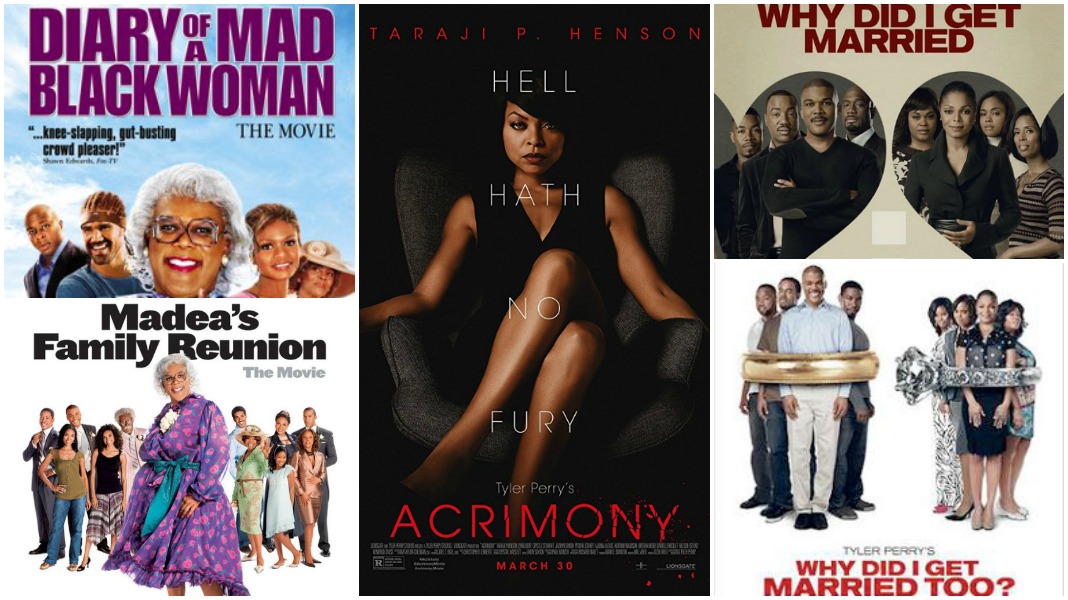 Tyler Perry, actor, producer, screenwriter, director, play-write, philanthropist, and all around bad-ass, has been serving up hot, tear-jerking dramas for the last two decades. In 2005, Perry’s Diary of A Mad Black Woman hit the big screen — a film literally chronicling a mad black woman as she escapes the clutches of an even madder black man. As the abusive, wealthy, philandering, color-stuck husband meets his crippled karma, the reformed mad black woman leaps helplessly into the arms of a broke guy with a braided hat. It wasn’t the classic fairytale love story ending, but it was our version of a happily ever after.
Tyler Perry, actor, producer, screenwriter, director, play-write, philanthropist, and all around bad-ass, has been serving up hot, tear-jerking dramas for the last two decades. In 2005, Perry’s Diary of A Mad Black Woman hit the big screen — a film literally chronicling a mad black woman as she escapes the clutches of an even madder black man. As the abusive, wealthy, philandering, color-stuck husband meets his crippled karma, the reformed mad black woman leaps helplessly into the arms of a broke guy with a braided hat. It wasn’t the classic fairytale love story ending, but it was our version of a happily ever after.
Despite the underlying theme that black girls don’t get to have it all, a common implication to be discussed at a later point, the girls loved this big screen adaptation of Tyler’s classic stage play. Just about as much as they loved Tyler’s 2006 follow up, Madea’s Family Reunion. Double the drama, double the quivering lip, double the old black lady quotables. Not to underwhelm, but Tyler gave us the rich abuser, the broke good guy, the abandoned kid, the toxic mama, and twerking cousins at a family reunion all in one film. In the end, the traumatized older sister got to borrow the wedding of the traumatized younger sister, complete with guests, cake and ceiling angels, and we all cheered as she floated down the aisle towards the bus driver of her dreams. Once again, the black girl got her average ever after.
Tyler put his foot on our throats and would not let up, hitting theaters with Why Did I Get Married in 2007. Eight married friends take a reunion getaway to put their relationships issues on full display in front of a wintery wonderland. Tyler chronicles the relationship woes of four female protagonists, two of them abusers, one of them abused, and the other Janet Jackson. The film grossed more than $60 million domestically and Tyler had done it again. Although the film did nothing to answer why any of these eight individuals got married in the first place, Tyler would take another wack at it in 2010 with a highly anticipated sequel.
In 2008, Angela Bassett hobbled across the screen serving all kinds of struggly single momma tease in Meet the Browns. Running from gangs and unpaid babysitter debt, Brenda (Angela) relocates her family to a tiny Georgia town where she finds family, a light-skinned step-daddy for her adult drug-dealing son, and of course, Mr. Brown. And while we were still catching our breath from watching Rick Fox glisten all over the screen, Tyler dropped I Can Do Bad All by Myself in 2009. A story about, bih you guessed it, a struggling black woman struggling to navigate the struggle of struggling. And who doesn’t love Taraji and Mary J Blige in a good hip hopera style melodrama? We watched April (Taraji) reluctantly raise her three abandoned relatives while juggling her married boyfriend, live in immigrant beau, and struggling singing career, and then we got the news: our beloved Madea was going to jail. Yes, 2009 brought us the classic, Madea Goes to Jail, where we watched Madea not actually go to jail by taking on the responsibility of rehabbing a young prostitute crack head, played by Keisha Knight-Pulliam. Candace (Keisha) later steals the fiancé of the District Attorney who tries to frame her for criminal activity. But she was really snooty and really light-skinned, so nobody felt bad for her.
Since then, Tyler has given us a plethora of films to choose from. Among them, Temptation: Confessions of a Marriage Counselor, The Single Mom’s Club, For Colored Girls, Why Did I Get Married Too, and most recently, Acrimony. All films chronicling the layered and complex experiences of women at various stages of their lives, primarily the experiences of black women. Narratives that undoubtedly need to be shared and discussed in the most authentic and unmasked way possible. Something Tyler Perry has proven time and time again that he is either incapable or unwilling to do. This isn’t just evident in the fact that Tyler, having produced over 15 major screen films in the last 13 years where he either portrayed a Black woman or featured a Black woman, has yet to do so with a Black woman’s input. Or anyone’s input for that matter, as Tyler is the only writer credited on all of his films and stage-plays. But beyond that, the repetitive nature of Tyler’s narratives when it comes to his portrayal of Black women leaves much to be desired. His repeated introduction of themes like child abandonment, drug use, domestic violence, mental health issues, spousal abuse, single parenthood and strained parental relationships without so much as a lick of consideration for the proper handling of these concepts beyond a backyard revival is not only irresponsible, it’s disrespectful. Tyler Perry’s protagonists are broken black women before they show up on the screen, indicative of the twisted perspective of the writer penning them to life. And although these outlandish stories are entertaining and humorous, they do nothing to move the conversation about the portrayal of black women in media forward. Not a single thing.
The Black community has long stomached narratives depicting us in the least flattering light possible. From slave films to the deadbeat thug and the single bitter baby mama, films about Black misfortune entertain us as much as they antagonize us. And we’ve all crammed into the theaters to see Tyler’s latest sad story, somehow getting a rise from watching other Black women humbled into their more deserving positions. Who told you you got to have it all anyway? The big house, wealthy husband, 2.5 kids by the same man and lavish threads are reserved for white princesses, Black girl just be happy a man wants you…whatever kinda man it might be. And we see this theme as brazen as ever in Tyler’s most recent film, Acrimony. A story where we see the typical Tyler themes present early on in the plot, the toxic mama, the angry black woman, unending struggle, and the infamous good guy. But in a strange turn of events, Tyler gave us an unconventional good guy. One who moonlights as a cheater, an emotional abuser, a manipulator and an all-around user. And this time the leading lady didn’t end up running off with the mechanic of her dreams, instead she ended up on a boat swinging an axe. But beyond all that, Tyler’s repeated inference that had the main character just endured more, she would have earned her happy ending is all the way offensive.
His portrayal of a Black woman who had had enough, who had turned two too many cheeks, who had finally snapped under the pressure was wildly sadistic and nonsensical. If Black women snapped to that degree every time Black men used, abused and tossed the to the side like waste, there would likely be no more Black men left. And furthermore, Tyler wasted the perfect opportunity to expound upon the ever-growing mental health issue among Black women in an honest and competent way. Instead, he choose to make the victim the villain, a role we play all too well. The reality is that we are not villains for not being superhuman. No human, not even the Black female kind, is built to endure the emotional, psychological, and financial strain that Black women endure, and yet, we are given little clemency when we buckle. Instead we’re painted as crazy, unhinged, violent, and illogical. Black women are not society’s punching bag and instead of making films punishing us for not being able to endure more, how about making a film where we don’t have to?
I won’t be going to see another Tyler Perry film. I’m adding him to my ever-growing list of rappers who only refer to Black women as hoes and bitches. I’m adding him to my ever-growing list of businesses that treat Black women with disregard and disdain. I’m adding him to my ever-growing list of television shows that insist upon promoting the public disgracing of Black women and anyone, for that matter, who would tell the Black woman’s story through any voice other than her own. Tyler Perry does not get a pass from me. If nothing else does, Black women deserve to have their stories told with sincerity and with integrity, both in real life and in works of art. And any Black man who would infer that a Black woman cannot have it all or should be humbled in her pursuit isn’t a Black man I choose to support. It’s been a great run and I can say we did share some good times, but Tyler Perry, it’s time to leave Black women alone.









